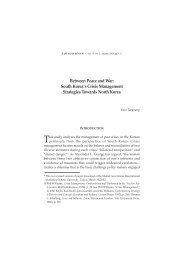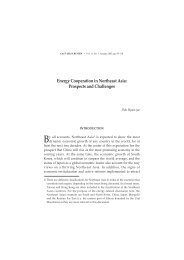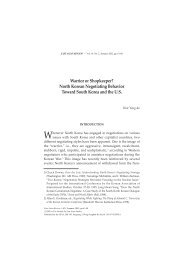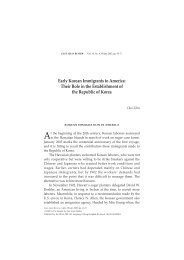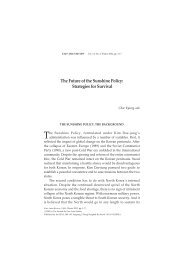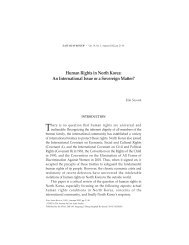Sino-Korean Relations since 1992 - the Institute for East Asian Studies
Sino-Korean Relations since 1992 - the Institute for East Asian Studies
Sino-Korean Relations since 1992 - the Institute for East Asian Studies
You also want an ePaper? Increase the reach of your titles
YUMPU automatically turns print PDFs into web optimized ePapers that Google loves.
18 EAST ASIAN REVIEW SPRING 2002<br />
Korea. South Korea is eager <strong>for</strong> China to participate in resolving <strong>the</strong><br />
<strong>Korean</strong> peninsula question <strong>since</strong> both countries share a mutual<br />
perspectives on South Korea’s engagement policy toward North<br />
Korea as well as on its approach on <strong>the</strong> <strong>Korean</strong> peninsula.<br />
In order to promote its cooperation, South Korea should<br />
thoroughly analyze China’s interest on <strong>the</strong> <strong>Korean</strong> peninsula, as well<br />
as interests of <strong>the</strong> two countries as a means <strong>for</strong> expanding <strong>the</strong> radius<br />
of action <strong>for</strong> South Korea’s diplomacy with China.<br />
Because South Korea’s policy has so far been based mainly on<br />
China’s role in resolving <strong>the</strong> <strong>Korean</strong> peninsula issue and on South<br />
Korea’s own needs, and not in consideration of <strong>the</strong>ir mutual<br />
interests, South Korea has, in fact, narrowed its room to maneuver.<br />
As seen in South Korea’s policy towards Taiwan and in <strong>the</strong> case of<br />
<strong>the</strong> Dalai Lama’s visit to Korea, its China policy was not based on<br />
<strong>the</strong> Chinese perspective. Ra<strong>the</strong>r, it acquiesced more than China<br />
expected it to, causing lack of flexibility.<br />
While South Korea is in desperate need of China’s cooperation,<br />
not only in South Korea’s sunshine policy, but in establishing peace<br />
and dissolving <strong>the</strong> Cold War structure on <strong>the</strong> <strong>Korean</strong> peninsula,<br />
<strong>the</strong>se key policy issues also correspond to China’s policy choices <strong>for</strong><br />
obtaining an interest on <strong>the</strong> <strong>Korean</strong> peninsula. However, to secure<br />
China’s positive role and to settle areas <strong>for</strong> cooperation between <strong>the</strong><br />
two nations, South Korea must define, as part of its <strong>for</strong>eign policy,<br />
<strong>the</strong> status of cooperative relations between China and South Korea,<br />
and must work on convincing <strong>the</strong> U.S. to adjust its policy to <strong>the</strong> post-<br />
Cold-War reality in Nor<strong>the</strong>ast Asia.<br />
As long as <strong>the</strong> <strong>Korean</strong> peninsula is divided, <strong>the</strong> South Korea-U.S.<br />
alliance and <strong>the</strong> South Korea-China partnership can be characterized<br />
as survival and development; however, in <strong>the</strong> case of conflict<br />
between <strong>the</strong> relations, <strong>the</strong> basis of judgment will be survival. Once a<br />
clear principle on <strong>the</strong> basic nature of U.S.-South Korea relations is<br />
clearly established, and <strong>the</strong> U.S. trusts in that principle, <strong>the</strong> potential<br />
close coordination and cooperation between China and South Korea,<br />
so vital to resolving <strong>the</strong> <strong>Korean</strong> peninsula issue, will not be



